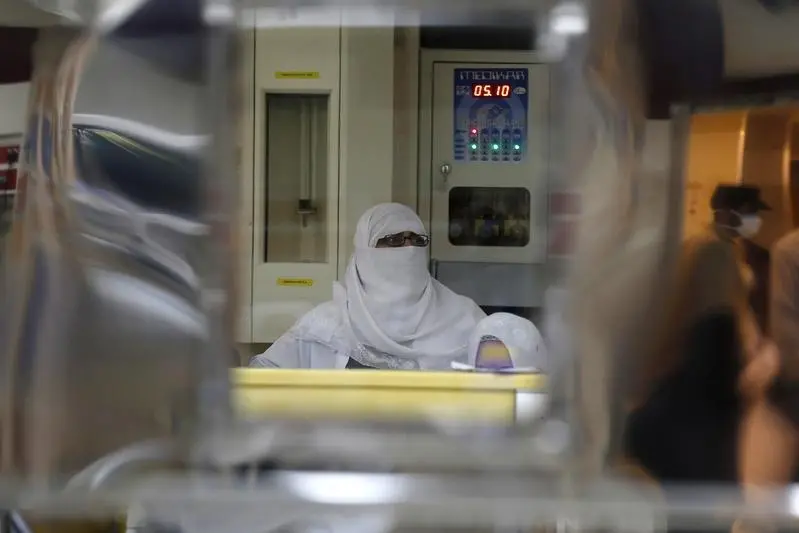PHOTO
The proposed medical liability law, which is to be discussed by the Shoura Council on Monday, bans terminating the life of any patient for any reason, even at their request or the request of the family.
Article 16 of the law will also ban human cloning and related research.
The law will prohibit artificial insemination except between legally married couples to treat infertility. The proposed penalty for violators of the ban is imprisonment for a period of not less than 10 years.
Dr. Alia Dahlawi, vice chairman of the council›s health committee, told Okaz/Saudi Gazette that the committee was currently considering the proposals submitted by the two former Shoura members, Dr. Nasser Bin Dawood and Dr. Ali Al-Ghafis, who is currently the minister of labor and social development, before tabling the final draft in the house.
The law aims to regulate litigation in medical malpractice cases, effectively promoting medical justice, applying Islamic law to ensure justice for medical practitioners as well as patients, and create the right environment for development and sustainability of healthcare institutions.
According to Article 17 of the law, it is not permissible to conduct female sterilization except on medical grounds supported by a report of a specialized medical team comprising not less than three doctors that confirms that pregnancy and childbirth could pose a real threat to the mother›s life. Violators may be punished by imprisonment for a term not exceeding five years and a fine of not less than SR50,000.
The law also bans any intervention with the purpose of birth control without the consent of the couple. The doctor may perform an abortion only if the pregnancy is a threat to the life of the mother, provided that the abortion is supervised by a specialist in obstetrics and gynecology and with the consent of the treating physician.
Abortion can also carried out if the fetus is deformed at the request of the parents before 120 days into the pregnancy. The malformation shall be determined by a medical team comprised of consultants in obstetrics, gynecology and oncology.
The law states that medical liability will not be affirmed if the injury was caused by the patient›s own act, refusal of treatment, failing to follow the instructions given by the treating physician or for an external factor, as well as for any complications known and expected in medical practice as side effects of treatment.
According to Article 32, the doctor or the service provider must practice the profession without obtaining insurance against the risks of the profession. The health establishment shall insure the practitioners for medical errors. It shall bear 80 percent of the annual insurance premium and the rest shall be borne by the dealer.
The health establishment is responsible for compensation for any error of a visiting doctor, and the insurance companies protect the health facilities and the insured persons in their obligations toward their patients.
The law proposes the formation of medical committees in general courts to consider malpractice suits and award appropriate compensations to the victims.
Article 16 of the law will also ban human cloning and related research.
The law will prohibit artificial insemination except between legally married couples to treat infertility. The proposed penalty for violators of the ban is imprisonment for a period of not less than 10 years.
Dr. Alia Dahlawi, vice chairman of the council›s health committee, told Okaz/Saudi Gazette that the committee was currently considering the proposals submitted by the two former Shoura members, Dr. Nasser Bin Dawood and Dr. Ali Al-Ghafis, who is currently the minister of labor and social development, before tabling the final draft in the house.
The law aims to regulate litigation in medical malpractice cases, effectively promoting medical justice, applying Islamic law to ensure justice for medical practitioners as well as patients, and create the right environment for development and sustainability of healthcare institutions.
According to Article 17 of the law, it is not permissible to conduct female sterilization except on medical grounds supported by a report of a specialized medical team comprising not less than three doctors that confirms that pregnancy and childbirth could pose a real threat to the mother›s life. Violators may be punished by imprisonment for a term not exceeding five years and a fine of not less than SR50,000.
The law also bans any intervention with the purpose of birth control without the consent of the couple. The doctor may perform an abortion only if the pregnancy is a threat to the life of the mother, provided that the abortion is supervised by a specialist in obstetrics and gynecology and with the consent of the treating physician.
Abortion can also carried out if the fetus is deformed at the request of the parents before 120 days into the pregnancy. The malformation shall be determined by a medical team comprised of consultants in obstetrics, gynecology and oncology.
The law states that medical liability will not be affirmed if the injury was caused by the patient›s own act, refusal of treatment, failing to follow the instructions given by the treating physician or for an external factor, as well as for any complications known and expected in medical practice as side effects of treatment.
According to Article 32, the doctor or the service provider must practice the profession without obtaining insurance against the risks of the profession. The health establishment shall insure the practitioners for medical errors. It shall bear 80 percent of the annual insurance premium and the rest shall be borne by the dealer.
The health establishment is responsible for compensation for any error of a visiting doctor, and the insurance companies protect the health facilities and the insured persons in their obligations toward their patients.
The law proposes the formation of medical committees in general courts to consider malpractice suits and award appropriate compensations to the victims.
© Copyright 2017 The Saudi Gazette. All Rights Reserved. Provided by SyndiGate Media Inc. (Syndigate.info).












